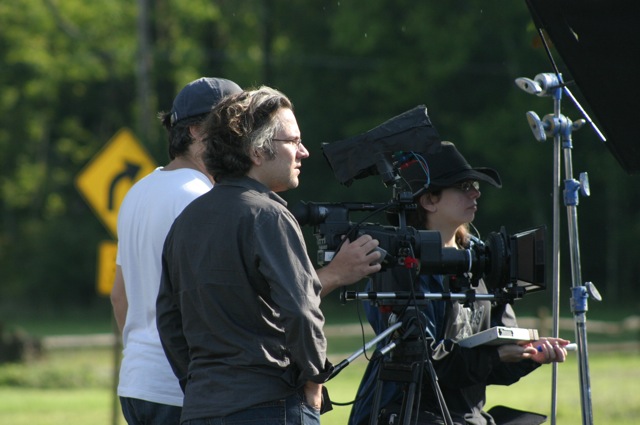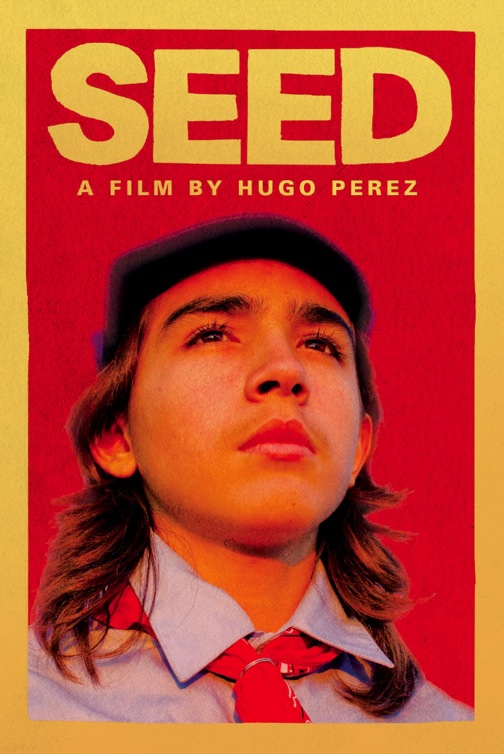Remember PBS? 3-2-1 Contact, Reading Rainbow, Ghostwriter … Okay, forget nostalgia. Public television now looks into the future with programs such as FutureStates, a series of short films by eleven award-winning indie filmmakers depicting their particular visions of the near future world.
Now, I often like my science drowned by a good wash of fiction, so that any parallels to real life can be entertaining, as opposed to scary as all hell.
Unfortunately, Hugo Perez’ SEED deals with the ominous (and already existing) scenario of genetically engineered seeds and a future where farmers pay exorbitant annual fees to “license” seeds—instead of buying and owning them—and face lawsuits from corporations should “un-licensed” plants (from one of the “copyrighted” seeds) appear on their farmland.
Hugo explains the agricultural takeover much better than I do, though! Read on for an interview.
I hear that you have come from the near future to warn us about the dangers our society faces today. Is that true?
If I confirmed that to you, I might interfere with the timestream and lead to the very catastrophe I am trying to avert so I cannot answer your question at this time. Let’s move on to the next question.
I was really excited to hear that you were working on your first science fiction film. Can you talk about the circumstances that led to your making the film?
Independent Television Service, aka ITVS, is an organization that funds independent films for broadcast on public television. Mainly, or almost entirely documentaries, the kind you might see on POV or Independent Lens. In the last few years, they wanted to get their feet wet with narrative, and also experiment with online broadcasting, and also reach out to younger audiences. And they came up with the idea of doing a web based series of short films that reflected on issues our world faces today through the lens of the near future. What came out of that is FutureStates.
So FutureStates is the name of the series?
FutureStates is the name of t he series that you can find at FutureStates.tv. The first season is made up of 11 short films by award-winning indie directors, each with their own particular vision of our world in the near future. Sadly, most of us see dystopias rather than utopias. As a director, I’m in great company with people like Greg Pak, whom I went to Yale with, Rahmin Bahrani, Tze Chun, and a bunch of other great filmmakers.
he series that you can find at FutureStates.tv. The first season is made up of 11 short films by award-winning indie directors, each with their own particular vision of our world in the near future. Sadly, most of us see dystopias rather than utopias. As a director, I’m in great company with people like Greg Pak, whom I went to Yale with, Rahmin Bahrani, Tze Chun, and a bunch of other great filmmakers.
What can you tell us about the film?
The film is titled SEED, and I like to think of it as retro near-future rural noir. That’s a mouthful, huh? It’s a story about the conflict between a father and a son set against the backdrop of a world in which a biotech company that I made up, the Mendelian Corporation, controls the worlds entire seed supply, the seeds are all genetically engineered, and heirloom (natural seeds) are outlawed because they are “a danger” to the food supply. The father is a farmer who skirts the law on occasion, and the son is a member of the Sprouts, a corporate youth indoctrination program that’s a cross between the boy scouts and Hitler youth. So there’s a conflict between the way the son and the father see the world that leads to a moment of crisis in the film.
Where did you come up with the idea?
A few years ago I started to read in the newspapers about how just a few companies control most of the world’s seed supply. The stories reported that increasingly those seeds are genetically engineered, and farmers are forced to ‘license’ the seeds rather than buy them. What that means is that farmers can’t re-use their seeds from year to year. They need to re-up their license or sometimes face being sued by the seed company if they violate their licensing agreement. Even worse than that is that it is alleged that the seed companies hire people to ‘inspect’ farms and if they discover that somehow one of your cornstalks or plants is grown from one of their copyrighted seeds, they will sue you.
So this part is real? This isn’t the future? This is really happening today?
Well, based on the newspaper stories that I’ve read, this is happening today. In my opinion, it seems like parts of farm-country in this country and Canada are being run like a giant protection racket in 1920’s Prohibition era Chicago. There are these agents or reps that are loosely associated with the seed companies that inspect fields and if they find copyrighted seed crops then the farmer gets sued for copyright infringement. Farmers can’t afford to fight the big companies so they settle with the companies, sometimes having to agree to destroy their entire crop and sign agreements that they will only use company seed from now on. Think about it. What happens if a bird picks up a seed from a farm that licenses the GMO seeds and then drops it on your farm and it grows into a plant and someone discovers it. Is that all it takes for a company to have grounds for a lawsuit? And from the stories that I read, there are people who also believe that sometimes GMO seeds are planted on farms so that the company can ‘find’ the copyright infringement and sue the farmer. It seems like a real X-Files kind of scenario but that is just my humble opinion.
And you expanded on that idea?
Yes. SEED is completely fiction. I just imagined what would happen if disease or blight wiped out a large portion of our food supply for a year or a few years. I envisioned a situation where a company would step in and say that they have the solution to our food shortages in their GMO seeds, and by the way why don’t we ban hierloom seeds because they are susceptible to disease and a danger to the food supply, and by the way we’ll now control the world’s entire seed supply because our seeds are the safest. What kind of political power would that give a company, and how would they enforce a ban on heirloom seeds? Despite the fears of the tea party movement about a left-wing take-over of our country, it seems to me the greatest danger of totalitarian or centrally controlled power in this country comes from the huge amount of power and influence that corporations have today. It’s not a question of right wing/left wing so much as who has enough money to influence public policies.
As a director how did you achieve the feeling of a near future world?
 Let me first say that world-building on a small scale film is challenging. That being said, I felt that the best way to create a world that was convincing was to make it as close to our own world as possible but with some subtle accents or highlights to indicate that we are in a reality like our own, but not our own. And then I couldn’t help adding in certain retro elements like the uniforms and Phillips’ company car (A black checkercab which we slapped the Mendelian logo on). A few people have commented that some of the aesthetic vibe of the world I’ve created is inspired by the aesthetics of the Cuban revolution and that’s probably true. The Sprouts are a tip of my hat to the young pioneers of Cuba (Los Pioneros). But then again, any centrally controlled ideological political movement of the 20th Century, left wing or right wing, from Hitler to Mao to Franco, has seen the value of indoctrinating the young… as well as the value of stylish uniforms. Did you know that three years ago, the New York Times reported that Hugo Boss made uniforms for the Nazis?
Let me first say that world-building on a small scale film is challenging. That being said, I felt that the best way to create a world that was convincing was to make it as close to our own world as possible but with some subtle accents or highlights to indicate that we are in a reality like our own, but not our own. And then I couldn’t help adding in certain retro elements like the uniforms and Phillips’ company car (A black checkercab which we slapped the Mendelian logo on). A few people have commented that some of the aesthetic vibe of the world I’ve created is inspired by the aesthetics of the Cuban revolution and that’s probably true. The Sprouts are a tip of my hat to the young pioneers of Cuba (Los Pioneros). But then again, any centrally controlled ideological political movement of the 20th Century, left wing or right wing, from Hitler to Mao to Franco, has seen the value of indoctrinating the young… as well as the value of stylish uniforms. Did you know that three years ago, the New York Times reported that Hugo Boss made uniforms for the Nazis?
I did not know that. That’s kind of frightening. And not a good seque into my next question… How did you find your cast?
I was really fortunate that my friend, collaborator, and the fantastic actor Adrian Martinez recommended some of his fellow members from the acclaimed Labyrinth Theatre Company, Yul Vazquez and Julian Acosta, who I cast as Phillips and Mateo. Actors of that caliber really bring a lot to the table and become collaborators and partners in shaping the characters. The other great discovery was Sebastian Villada who plays Juan. I saw him in a fantastic indie feature Entre Nos which was his first film. SEED is only the second film he’s done but he’s a natural. By the way in addition to SEED, Yul Vazquez can be seen this summer in The A-Team reboot as a bad guy. If you watch the second A-Team new trailer, you can see him punching out Bradley Cooper.
What are some of your favorite recent SF films?
I thought District 9 was awesome if a little uneven. Moon was great. And Alfonso Cuarón hit it out of the ballpark with Children of Men. I think if there’s a new wave of sci-fi films that reflect on our world in a speculative way in the vein of the great Sci-Fi of the 60s and 70s, these films are at the forefront. And I think they are just the tip of the iceberg of social commentary sci-fi that we’ll be seeing in the next few years.
What are you working on now?
Among other things, I am working on a feature screenplay of SEED. I feel like there’s a lot more in that world that I want to explore, getting into the backstory of Mateo and Phillips and how they chose the paths that brought them to the moment where SEED takes place. I’m also working on a couple of dark comedies: one of them I like to describe as Amelie meets Glengarry Glen Ross and it’s set against the backdrop of the Brooklyn real estate market and the clash of old world and new world in neighborhoods like Williamsburg.
Thanks for taking the time to talk to us.
No, no. Thank you!
*
Stay posted on what Hugo is up to at his website, www.m30afilms.com.










